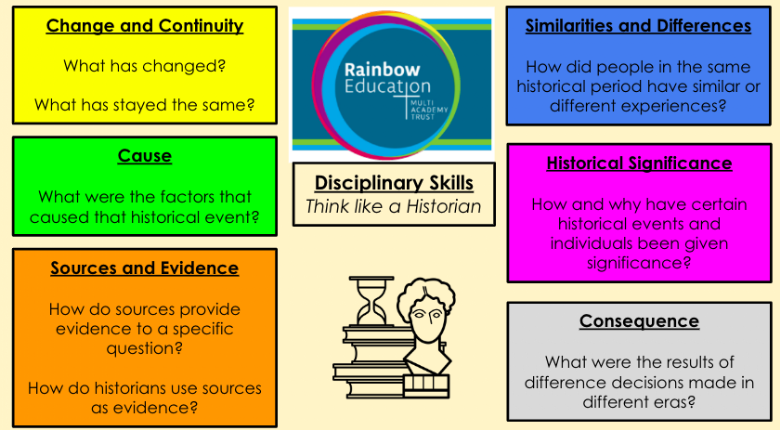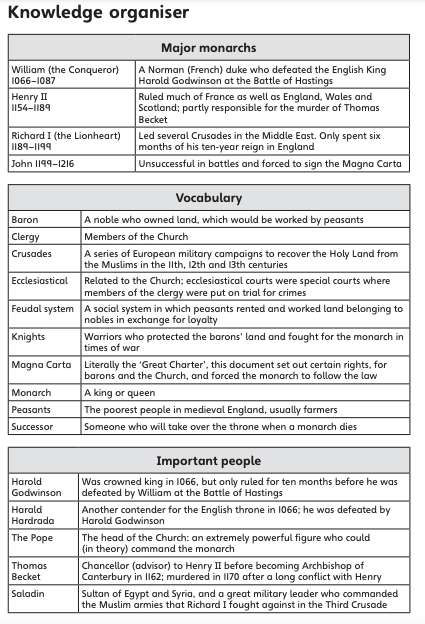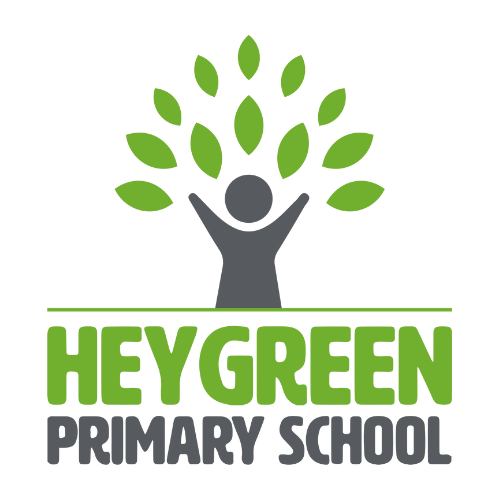
History
In these foundation subjects, we use a knowledge-rich curriculum that is structured to serve key principles of cognitive science. Scientific research has shown that knowledge is essential to the development of critical thinking and reading comprehension. Research has also shown that those who are rich in knowledge gain new knowledge quicker and more effectively. We therefore place the acquisition of knowledge at the heart of the learning process.
Our aim is for all children to access challenging curriculum content that covers a range of subject-specific concepts. We seek to achieve this through the use of high-quality curriculum materials – mini-textbooks and knowledge organisers that lay out specific, detailed, well-sequenced knowledge – and pedagogical practices that seek to ensure the knowledge is not merely encountered but fixed in the long-term memory.
Just as KS2 prepares pupils for learning in secondary school, the KS1 curriculum has been designed to introduce pupils to key subject-specific concepts and vocabulary in order to prepare them for the move through their primary education.
Across KS1 and KS2, the use of pre-planned curriculum materials means that we quality assure the content taught. The KS2 materials were created through a government-led incentive by Reach Academy, London; the KS1 materials were developed by teachers within the Rainbow Trust. They support teachers in their planning so that time can be focused on the development of subject knowledge and pedagogical practice. The development of children’s knowledge and understanding is further deepened through links made in reading lessons. Below is a detailed breakdown of the curriculum materials and in implementation of these subjects at KS2.
Our curriculum is carefully weighted, with equal priority given to both substantive knowledge (people, dates and events) and disciplinary knowledge (how historians work and come to their conclusions). Clearly defined substantive knowledge end points are identified at the end of the end of the unit, and disciplinary knowledge end points at the end of each key stage. Components (building blocks) are carefully sequenced so new knowledge builds on what has been previously taught and leads to the end points.
CONCEPTS
Key concepts, for example, 'empire', 'legacy', 'religion' and 'settlement' are covered and repeated throughout the curriculum. Vocabulary is also taught explicitly in every lesson. Keywords and concepts are mapped out in our concept mapping document.
We have made enhancements to our curriculum through an artefact starter and a disciplinary task, so children have the opportunity to practice the key historical disciplinary concepts, e.g. historical significance, similarities and differences and change and continuity. See our 'Think Like a Historian' poster below, which is used to scaffold children as they make judgements about the past.

KNOWLEDGE ORGANISERS
A knowledge organiser is at the heart of each unit. It itemises the core content and knowledge necessary to develop a sophisticated schema for each unit of work. Over the course of the years, these knowledge organisers ensure that all pupils become ‘culturally literate’ (Hirsch, 1987) and have the opportunity to engage with and build ‘powerful knowledge’ (Young, 2013).


WORK BOOKLETS
Each KS2 unit includes a work booklet, with every lesson laid out to include a rich, challenging but age-appropriate text. Key graphics, images and diagrams are included alongside the text. In line with Rosenshine’s (2012) principles of effective instruction, each lesson is broken into manageable chunks of learning, with questions and tasks providing regular opportunities to practice new learning. The work booklet clearly sets out the understanding that teachers will develop in class, ensuring high academic expectations of all pupils (Rosenthal & Jacobson, 2008). Increasing the subject knowledge of teachers, especially non-specialists within primary school settings, has been identified as the most important controllable factor associated with student outcomes (Coe et al, 2014). Having used these materials for some time, our teachers have developed their understanding of how to provide further opportunities for deep learning.
QUIZZING
The benefit of retrieval practice is one of the most robust findings in cognitive psychology (Roediger & Karpicke, 2006; Storm, Bjork & Storm, 2010). When pupils are asked to pull information from their memory, it becomes more securely embedded. Each lesson begins with a retrieval quiz, but we also use a range of retrieval strategies to ensure content from across the curriculum is retained in the long-term memory through spaced retrieval.
LESSON PLANS
Each unit consists of six, carefully sequenced ‘knowledge lessons’, which can be contrasted with popular but ultimately less effective ‘discovery-based’ lessons described by Kirschner, Sweller and Clark (2006) as ‘minimally guided instruction’. In line with findings from cognitive load theory (Baddeley & Hitch, 1974; Baddeley 1986; Rosenshine 2012; Sweller, 1988) lessons are chunked into small sessions of explicit teaching followed by regular opportunities for all children to think, apply and practice key skills and knowledge.
SLIDE SHOWS
Although the curriculum package comes with slide shows for classroom use, our teachers have had training to enhance this resource to aid pedagogy and develop better pupil understanding. By standardising these slide shows, we are able to provide consistency across the schools and support teacher workload through the sharing of resources across year groups. The adaptations we have made aim to aid metacognition, enhance assessment for learning, making wider curriculum connections explicit, use ‘dual coding’ (Paivio 1986; Mayer & Moreno, 2003) to enhance understanding, provide subject-specific vocabulary at the point of use, provide rubrics for self and peer marking, develop teaching of tricky concepts, and create opportunities for deep thinking and application of knowledge.
KS1 RESOURCES
The KS1 curriculum has been created to ensure that National Curriculum objectives are covered and introduce concepts that will be returned to in KS2 as part of a sequenced learning journey. The entire curriculum has been mapped out to help teachers see the links between different units of study. As with KS2, support materials have been created that include subject knowledge overviews, lesson slides, retrieval quizzes and lesson tasks to ensure consistency across the schools. These are reviewed regularly and evolve in accordance with teachers’ feedback.
